If you are looking for the best Linux books, you have arrived at the right place. Here are the top 10 books written by the finest authors out there.
But first,
What is Linux?
A brainchild of Linus Torvalds, Linux is an open-source operating system. As a popular operating system since 1991, it is everywhere, from phones to thermostats to smart televisions. Even today, the operating system is relevant, as it is a Unix-based system designed to be stable, robust, and reliable. Moreover, it is also an ideal platform to start your career in programming.
Books can be a great source when it comes to learning Linux. However, considering the wide range of books available, choosing the right book can get confusing. Breathe easy, as we have compiled a list of the ten best Linux books for quicker and easier learning.
So, let’s get started!
10 Best Linux Books In 2024
1. The Linux Command Line (2nd Edition): A Complete Introduction
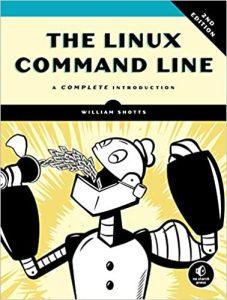
Author: William Shotts
Originally Published: 7 March 2019 (2nd Edition)
Publisher: No Starch Press
The Linux Command Line perfectly blends complex and essential Linux concepts. The book is just 500 pages long, divided into 36 small, digestible chapters, each covering a different topic.
The book offers more than just theory, which makes it stand out. It encourages readers to create a bunch of dummy files and perform operations. True to its name, the book walks you through several handy command-line tips. It even has some efficient examples to help solidify your understanding of complex concepts.
Our Verdict:
William Shotts, the author, also explains the philosophy behind the tools. The Linux Command Line is one of the rare books covering Bash 4.0 and Associate Arrays in detail. It is also rated as one of the best Linux textbooks out there.
You can buy this book here.
2. Linux Bible (10th Edition)
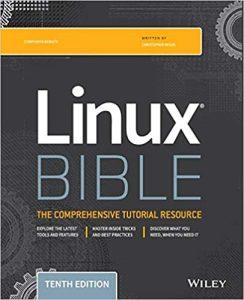
Author: Christopher Negus
Last Edition: 8 June 2020 (10th Edition)
Publisher: Wiley
This latest edition of the Linux Bible is the best Linux book for beginners and intermediate users. With several exercises scattered across the book, author Christopher Negus takes a step-by-step approach to teach Linux programming. The book emphasizes command-line tools, making it all the more relevant and enriching.
It starts with the fundamentals of Linux and gradually progresses into complexity. It also focuses on Red Hat Enterprise Linux (RHEL), Ubuntu, and Fedora. The RHEL section of the book is the best compared to any other book, making it perfect for you if you want to master RHEL.
Our Verdict:
The book has a great layout and doesn’t disappoint, even if you are an advanced programmer. It can also be a great reference book for all your Linux learning requirements.
You can buy this book here.
3. Linux Pocket Guide: Essential Commands 3rd Edition
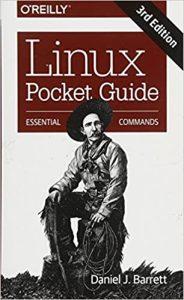 Author: Daniel J Barrett
Author: Daniel J Barrett
Last Edition: 8 July, 2016 (3rd Edition)
Publisher: O’Reilly
If you have an upcoming exam or job interview requiring you to go through the Linux commands quickly, the Linux Pocket Guide could help. This small, fast-paced guide is enough to help you sharpen your knowledge.
This book is not for you if you want a comprehensive guide on the “how-to” of Linux. However, the book isn’t a great fit for complete beginners, as it assumes you know your way around Linux or Unix quite a bit. On the upside, it helps if you are making the switch from Windows to Linux.
Our Verdict:
Keep this book by your side if you keep forgetting the obscure command lines every time you return to Linux. It will save you a lot of time and effort. That’s why we rate it as the best resource for learning all the command lines.
You can buy this book here.
4. How Linux Works (2nd Edition): What Every Superuser Should Know
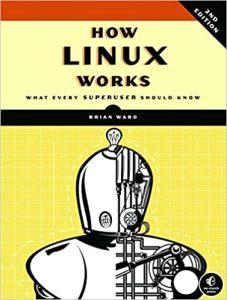
Author: Brian Ward
Last Edition: 14 November, 2014 (2nd Edition)
Publisher: No Starch Press
How Linux Works will help you learn the inner working of Linux. It covers a variety of essential topics in less than 400 pages. Note that, the book teaches you about the Linux world and not how to use Linux. It will make your theory clearer, explaining the philosophy behind the command lines.
If you are new to programming, getting to know the inner workings of the various operating systems is always a good idea. The book does an excellent job at that. Think of the book as a great place to start your Linux journey from scratch. In a nutshell, no other book discusses Linux in the way this book does.
Our Verdict:
If you can appreciate the dry sense of humour of the author, it ends up being a fun read.
You can buy this book here.
5. Advanced Programming in the UNIX Environment (3rd Edition)
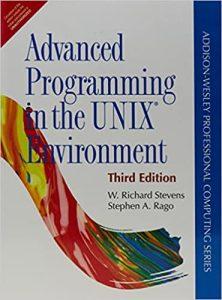
Author: Rago Stevens
Last Edition: 1 January, 2017
Publisher: Pearson India
This is an advanced-level book for anyone looking to get an in-depth knowledge of Linux. It is considered to be the best book for programmers.
The book explains the fundamentals of Linux-like directories and then slowly builds up to more complex topics, such as signal handling. It also draws attention to the primary pitfalls involved in learning Linux.
The author has maintained his easy-to-understand writing style throughout the book, which helps when dealing with advanced topics. The book takes a learn-through-examples approach, as numerous examples are provided for practising what you read. It also contains several case studies that mimic the contemporary environment. This helps cement the facts learned throughout the book.
Our Verdict:
All in all, this is a must-have book for any serious UNIX learner.
You can buy this book here.
6. UNIX and Linux System Administration Handbook (5th Edition)
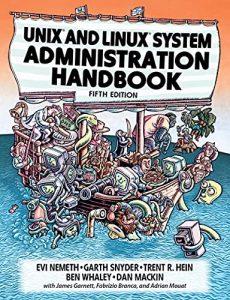
Authors: Evi Nemeth, Garth Snyder, Trent Hein, Ben Whaley, Dan Mackin
Last Edition: 23 August, 2017 (5th Edition)
Publisher: Addison-Wesley
As the best book to learn Linux, it is a definitive guide for the installation, configuration, and operation of any Unix or Linux system. It also covers a wide range of Unix systems and administration. The book’s latest edition includes new chapters on configuration management, containers, cloud computing, and other recent developments.
Due to its extensive coverage of topics, this book is a handy reference to Linux. It has detailed instructions to cover every facet of system administration. The examples are also great as they provide tonnes of information. However, on the downside, it has dropped Solaris, AIX, etc., from the previous versions.
Our Verdict:
You can keep the book on your shelf for ready reference. After all, it has everything the best Linux books should have.
You can buy this book here.
7. The Linux Programming Interface
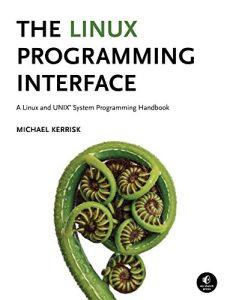
Author: Michael Kerrisk
Last Edition: 1 October, 2010 (1st Edition)
Publisher: No Starch Press
The Linux Programming Interface by Michael Kerrisk is a guide to the Linux and UNIX programming interfaces. It serves the dual purpose of being an excellent introduction to Linux as well as an equally potent reference book. It does a great job of simplifying the Linux OS and its kernel for easy consumption.
The book is full of descriptions of system calls and library functions, thanks to over 200 examples. The book covers some of the other topics as well, including signals, clocks, timers, building, and using shared libraries. As the examples mostly make use of C, it is advisable to acquire a working knowledge of C before you proceed with the book.
Our Verdict:
The Linux Programming Interface is a must-read for anyone new to Linux and its kernel.
You can buy this book here.
8. Linux for Beginners: An Introduction to the Linux Operating System and Command Line
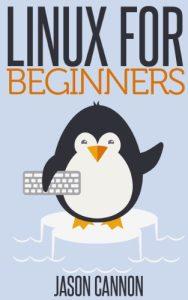
Author: Jason Cannon
Last Edition: 2 January, 2014
Publisher: Createspace Independent Pub
As the name indicates, this book is exclusively for beginners. The author has taken a comprehensive approach by accumulating all the information in one location. No major topic is skipped, and everything is explained effectively and transparently.
The book provides you with everything you need to get started with the command line. It is easy to follow and doesn’t overwhelm beginners with minute details. With just 200 pages, the book can be easily read over the weekend.
Our Verdict:
Although the book is not a comprehensive guide, it will help you learn Linux command lines in no time.
You can buy this book here.
9. Linux in a Nutshell: A Desktop Quick Reference (Sixth Edition)
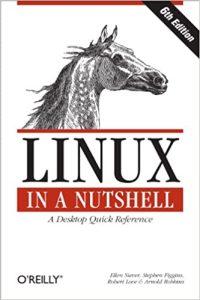
Author: Ellen Siever, Stephen Figgins, Robert Love, Arnold Robbins
Last Edition: 13 October 2009 (6th Edition)
Publisher: O’Reilly
Linux, in a Nutshell is one of the best Linux books for beginners. Although the term “in a nutshell” is a bit contentious as the book is a few pages shy of 1000.
All the commands are discussed in the book, which makes up almost half of the book. It is safe to say that even if someone reads a few commands every day, they can get acquainted with the Linux systems. This book is valuable even if you know your way around commands and want to check if you are using the proper parameters.
Our Verdict:
The book has been in print for many years and has only improved with time. The latest edition is no different and lives up to its “bestselling” tag.
You can buy this book here.
10. Linux Kernel Development (Developer’s Library) (3rd Edition)
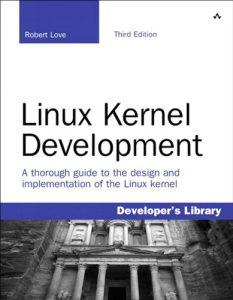
Author: Robert Love
Last Edition: 1 July, 2010 (3rd Edition)
Publisher: Addison-Wesley
Linux Kernel Development is an excellent book to get you to the next step in learning Linux if you are already familiar with the basics. It upgrades your knowledge of data structures, schedulers, interrupt handlers, and other key topics.
The book is well organized and easy to follow. It explains the kernel right from the basics. You will come across some valuable codes that help you understand the concepts. Plus, a real in-depth explanation is provided when you work with the regulations.
Our Verdict:
The book also contains a short section on kernel coding style. All in all, it’s an excellent book for intermediate Linux learners.
You can buy this book here.
Conclusion
No one book is sufficient for Linux. Some can be the perfect introduction to the OS, some work as excellent platforms for further reading, and some take your knowledge to the next level. That said, it’s crucial to find the right book for yourself, considering your learning goals. So, that was our list of the ten best Linux books. Did we miss any of your favorite books? Let us know in the comments.
Frequently Asked Questions
1. Can I use Linux on my own?
Answer: Linux is not so difficult to learn. The more you know about the technology, the easier it is to master the basics of Linux. You can learn the basic commands in a few days, depending on your efforts. However, learning and understanding these commands will take a few weeks.
2. Is Linux OS free?
Answer: Yes, Linux is free and an open-source operating system released under the GNU General Public License. In simple words, anyone can run, modify, study, and redistribute the source code and even sell copies of the modified code.
3. Can I install Linux in Windows 10?
Answer: Yes, you can install Linux in Windows 10 without using any second drive or a virtual machine with the help of Windows Subsystem for Linux.
4. Is it important to learn Linux?
Answer: Here are some of the reasons why you should learn Linux:
- It is an interesting subject.
- It makes life more convenient.
- Linux software saves a lot of money.
People are also reading:

